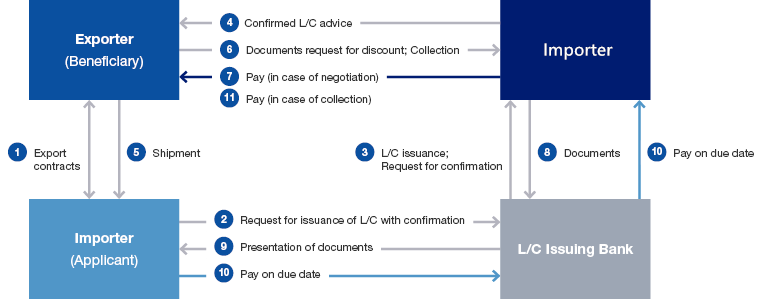Be your Logistics Department in China
Customized logistics solutions, your logistics expert in China
Customized logistics solutions, Shipping from China to the World
Tel:+8613424475220 Email:info@viputrans.com 
What if the L/C is expired, what shall we do?

Although there are many different payment methods in international trade, it is believed that most suppliers still accept TT and LC, because these two payment methods are relatively safe and guaranteed, but LC is a little more complicated than TT. So today we are going to learn about LC payment methods and what to pay attention to.
LC (letter of credit) LC is mainly composed of sight LC and usance LC, that is, LC at sight or LC XX days. Although both of them are letters of credit, the time of payment varies, so does the risk. As for the specific difference and risk degree of different letters of credit, we need to learn more for a detailed understanding, here we take LC at sight as an example.
LC has two dates that need special attention, one is the latest delivery date and the other is the validity period of LC.
The latest delivery date is the latest shipment date, that is, the shipment date shown on the bill of lading. If you miss the latest delivery date, you will incur the discrepancy fee or even the customer's refusal to pay. So the consequences can be imagined. Therefore, it is important to verify the latest delivery date with the factory when reviewing the LC draft to avoid reducing risks and avoiding losses. In addition, the validity of LC is generally about 15-20 days different from the latest delivery date. But what should I do if I miss the expiry date of LC but haven't shipped yet? Here's a case about LC expiration.
Recently, my customer Q has encountered some troubles. One of the shipments of LC at sight has to reject the shipment due to the expiration of LC.
Because the customer needs this batch of goods urgently, so the latest date of delivery and validity period the customer set is short. Due to the customer order quantity being large, the production time is urgent, so the order had not been able to finish in the latest delivery within the time. but when the goods were completed, the customer was required not to make the shipment with the reason that the LC had expired and the Banks had cleaned up the LC documents and the documents would not be accepted. if we don't hold on to the shipment, it will likely lead to the goods stranded in port. Actually what the customer said is not alarmist. the LC is from the bank guarantee. If it is expired and we insist on delivery, sending out the goods without any guarantee is equivalent. the customer can refuse to pay. if customers have a bad reputation the supplier is likely to face great loss. So we must be aware of LC.
Firstly, we can negotiate with the customer to extend the latest delivery date and validity period of LC about half a month before it expires, and then complete the delivery within the new deadline. Why about half a month earlier? Considering that the amendment of LC requires a certain amount of time, some large companies may apply for complicated procedures, so they also need to reserve a certain amount of time. it is necessary to know the deadline of LC customers, and timely follow-up to avoid rejection of overdue products.
However, if the LC expires for a long time but the goods are not delivered yet, we can negotiate with the customer to open a new letter of credit, and then complete the delivery within a new period. The above two ways compare the results of idealism, another case is the customer is likely to be refused to open an LC or extend the validity of the LC, in this case, can negotiate with our customer to make Banks accept expired LC, but of course, the prestige good customer for company as long as the customer agrees to accept the expired LC can also be done by the normal process transactions, but also must remember let customers give you a formal written confirmation email, lest in the case of any disputes at least some protection.

Navigating the complexities of international trade requires a keen eye, especially when it comes to managing Letters of Credit (LCs). Recognizing the signs of an impending LC expiry is crucial in maintaining smooth business operations and safeguarding financial interests. Here’s how you can stay ahead of the curve and ensure that an 'LC expired' notice doesn't catch you off guard.
Maintain a Detailed LC Calendar: Keep a dedicated calendar for all your LCs, noting their issuance and expiry dates. Update it regularly to reflect any changes or extensions. This proactive approach allows you to have a clear overview and act promptly if an LC is nearing its expiry.
Set Up Alerts: Utilize digital tools or banking software that can send you alerts as the LC expiry date approaches. Setting reminders a few weeks or even months in advance can provide ample time to take necessary actions.
Regular Reviews: Make it a routine to review your LCs periodically. Check not just the expiry dates, but also the terms and conditions, to ensure everything is in order and there are no surprises.
Communicate with Your Bank: Establish a good relationship with your bank and regularly communicate about the status of your LCs. They can provide valuable insights and reminders about upcoming expiry dates.
Preventing Financial Disruptions: An expired LC can disrupt your financial flow and lead to delayed shipments or payments. By staying vigilant, you can take preemptive measures to renegotiate terms or seek extensions, maintaining the continuity of your business operations.
Maintaining Good Relationships: Timely action on an expiring LC reflects well on your professionalism and reliability. It helps maintain and build trust with your suppliers and buyers, which is crucial for long-term business relationships.
Risk Mitigation: Staying alert to LC expiry dates allows you to assess the potential risks involved if the LC were to expire. You can plan alternative strategies, such as arranging for backup financing options or negotiating new terms with your trade partners.
Regulatory Compliance: In some cases, letting an LC expire without proper action can lead to regulatory issues, especially if it pertains to international trade laws and customs. Vigilance helps you stay compliant and avoid legal complications.
In summary, recognizing the signs of an LC expiry isn't just about marking a date on your calendar. It's about proactive management, regular reviews, and maintaining open lines of communication. By staying vigilant, you can navigate the waters of international trade with confidence, ensuring that 'LC expired' is a scenario you're fully prepared to handle.
Communication Is Key: Initiating dialogue with all involved parties.
When you're faced with an 'LC expired' situation, the first and most crucial step is to communicate. Reach out to all parties involved - this includes the issuing bank, the beneficiary, and any intermediaries. Promptly initiating dialogue helps in understanding the situation from every perspective and sets the stage for finding a resolution.
Review LC Terms: Understanding your rights and responsibilities under the expired LC.
Each LC comes with its specific set of terms and conditions. When it expires, reviewing these terms is essential to understand what your rights and responsibilities are. Look for any clauses that might provide guidance on what to do in case of expiry and identify any potential penalties or liabilities.
Seek Professional Advice: When to consult a legal or financial expert.
If the situation seems complex or if a significant amount of money is at stake, it's wise to seek professional advice. A legal or financial expert specializing in trade finance can provide valuable insights into your options and the best course of action.
Requesting an Extension: Steps to ask for an LC renewal and its likelihood of success.
One of the first steps in resolving an 'LC expired' scenario is to request an extension. Contact the issuing bank and explain the situation, providing valid reasons for the delay and any supporting documentation. The success of this request often depends on the credibility of the parties involved and the nature of the delay.
Negotiating New Terms: How to approach renegotiations and secure a new LC or alternate arrangements.
If an extension isn't feasible, you might need to negotiate new terms. This could involve setting up a new LC or agreeing on different payment terms. Be clear about what you need, understand the other party's position, and strive for a solution that benefits all.
Legal Recourse: Understanding your legal standing and potential actions if negotiations fail.
In cases where negotiations don't lead to a resolution, you may need to consider legal recourse. Understand your legal standing by consulting with a lawyer who specializes in international trade. They can guide you on the potential actions you can take to protect your interests.
Proactive Monitoring: Setting up systems to track LC expiry dates.
One of the best ways to mitigate the risk of an LC expiring is to monitor it proactively. Use a system that alerts you well in advance of the expiry date, so you have ample time to take action. Regular checks and balances can prevent last-minute scrambles and ensure you're always prepared.
Realistic Deadlines: Negotiating feasible timelines when establishing LC terms.
When setting up an LC, ensure the timelines are realistic. Consider potential delays and set a reasonable expiry date that provides a buffer for unexpected events. Clear and feasible deadlines can significantly reduce the risk of an LC expiring before the transaction is complete.
Building Strong Relationships: How good relationships with customers can help in resolving LC expired situations.
Strong relationships with your customers and suppliers can be invaluable in resolving 'LC expired' situations. When both parties trust each other and have a history of positive interactions, they're more likely to work together toward a mutually beneficial solution.
By taking these immediate actions and seeking resolution through open communication, understanding, and strategic planning, businesses can effectively navigate and mitigate the risks associated with an LC expiry.

Communication Is Key: Initiating dialogue with all involved parties.
When you're faced with an 'LC expired' situation, the first and most crucial step is to communicate. Reach out to all parties involved - this includes the issuing bank, the beneficiary, and any intermediaries. Promptly initiating dialogue helps in understanding the situation from every perspective and sets the stage for finding a resolution.
Review LC Terms: Understanding your rights and responsibilities under the expired LC.
Each LC comes with its specific set of terms and conditions. When it expires, reviewing these terms is essential to understand what your rights and responsibilities are. Look for any clauses that might provide guidance on what to do in case of expiry and identify any potential penalties or liabilities.
Seek Professional Advice: When to consult a legal or financial expert.
If the situation seems complex or if a significant amount of money is at stake, it's wise to seek professional advice. A legal or financial expert specializing in trade finance can provide valuable insights into your options and the best course of action.
Requesting an Extension: Steps to ask for an LC renewal and its likelihood of success.
One of the first steps in resolving an 'LC expired' scenario is to request an extension. Contact the issuing bank and explain the situation, providing valid reasons for the delay and any supporting documentation. The success of this request often depends on the credibility of the parties involved and the nature of the delay.
Negotiating New Terms: How to approach renegotiations and secure a new LC or alternate arrangements.
If an extension isn't feasible, you might need to negotiate new terms. This could involve setting up a new LC or agreeing on different payment terms. Be clear about what you need, understand the other party's position, and strive for a solution that benefits all.
Legal Recourse: Understanding your legal standing and potential actions if negotiations fail.
In cases where negotiations don't lead to a resolution, you may need to consider legal recourse. Understand your legal standing by consulting with a lawyer who specializes in international trade. They can guide you on the potential actions you can take to protect your interests.
Proactive Monitoring: Setting up systems to track LC expiry dates.
One of the best ways to mitigate the risk of an LC expiring is to monitor it proactively. Use a system that alerts you well in advance of the expiry date, so you have ample time to take action. Regular checks and balances can prevent last-minute scrambles and ensure you're always prepared.
Realistic Deadlines: Negotiating feasible timelines when establishing LC terms.
When setting up an LC, ensure the timelines are realistic. Consider potential delays and set a reasonable expiry date that provides a buffer for unexpected events. Clear and feasible deadlines can significantly reduce the risk of an LC expiring before the transaction is complete.
Building Strong Relationships: How good relationships with customers can help in resolving LC expired situations.
Strong relationships with your customers and suppliers can be invaluable in resolving 'LC expired' situations. When both parties trust each other and have a history of positive interactions, they're more likely to work together toward a mutually beneficial solution.
By taking these immediate actions and seeking resolution through open communication, understanding, and strategic planning, businesses can effectively navigate and mitigate the risks associated with an LC expiry.
Copyright © 2003-2025 VIPU Supply Chain Logistics Co., Ltd. | All Rights Reserved
LOGISTICS | E-COMMERCIAL FULFILLMENT | ABOUT US | CASE | NEWS | VIDEO | CONTACT US
We will find the fastest or the cheapest way for your shipment. Please specify: where from, where to, what to ship.